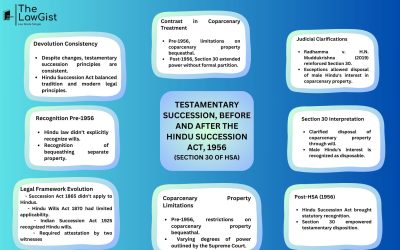INTRODUCTION
The Hindu Succession Act, 1956, governs the inheritance of property among Hindus. Section 22 of this Act introduces the concept of “Preferential Right,” which is often confused with the “Right of Pre-emption.” This discussion aims to clarify the distinctions between these two legal concepts.
UNDERSTANDING PREFERENTIAL RIGHT UNDER SECTION 22 OF HINDU SUCCESSION ACT,1956
-
Definition and Scope
Section 22 grants a preferential right to heirs specified in class I of the Schedule when an interest in immovable property or a business of an intestate devolves upon them. If one heir intends to transfer their interest, other heirs in the same class have the right to acquire the proposed interest.
-
Timing of Exercise
The crucial aspect of preferential rights under Section 22 is that it can be invoked before the actual sale transaction takes place. This means that when a co-sharer plans to transfer their share, other co-sharers can apply to purchase that share. This situation can arise through oral or written agreements between co-sharers and third parties.
RIGHT OF PRE-EMPTION: A DISTINCT CONCEPT
-
Definition and Essence
In contrast, the right of pre-emption is a distinct legal concept. It refers to the right of an owner of immovable property to acquire another immovable property that has been sold to a third party. Essentially, it is a right of substitution rather than repurchase, allowing the pre-emptor to step into the shoes of the buyer.
-
Triggering the Right
Unlike the preferential right under Section 22, the right of pre-emption is triggered after the completion of the sale transaction. The pre-emptor exercises this right to substitute themselves for the buyer. This right can be recognized by state acts, customs, or precedents, and in the absence of statutory provisions, it can be exercised as a civil right.
PROCEDURAL DIFFERENCES: SECTION 22 VS. RIGHT OF PRE-EMPTION
-
Initiating the Process
Section 22 involves a proactive approach, where heirs, upon learning of a potential transfer, can apply for the purchase of the share before the sale occurs. On the other hand, the right of pre-emption is reactive, initiated after the completion of the sale, when the pre-emptor seeks to substitute themselves for the buyer.
-
Determination of Consideration
Under Section 22 of The Hindu Succession Act,1956 the consideration for the transfer is determined by the court in the absence of an agreement between the parties. Conversely, in the right of pre-emption, the consideration is typically the same as that agreed upon in the original sale transaction. The pre-emptor steps into the shoes of the original buyer, assuming the terms of the existing contract.
COURT’S ROLE IN PREFERENTIAL RIGHT AND PRE-EMPTION
-
Role in Preferential Right
The court plays a pivotal role in Section 22 cases. It determines the consideration for the transfer upon application by the parties. If the acquiring party is unwilling to accept the determined consideration, they may be liable for all costs related to the court application.
-
Role in Pre-emption
In cases of the right of pre-emption, the court’s role is different. It assesses whether the pre-emptor has a valid claim and, if so, issues a decree for pre-emption. This decree necessitates the cancellation of the original sale deed, protecting the pre-emptor’s rights in the property.
LEGAL IMPLICATIONS AND CONSEQUENCES
-
Preferential Right Implications
The preferential right under Section 22 aims to maintain the cohesiveness of inherited property among heirs. It allows for a fair distribution of interests among heirs before external parties become involved. Failure to respect this preferential right may result in legal consequences.
-
Pre-emption Consequences
On the other hand, the right of pre-emption ensures that owners of neighboring properties have the opportunity to acquire adjacent land, preventing fragmentation. The cancellation of the original sale deed is a consequential step to safeguard the pre-emptor’s interests.
JURISDICTION AND DEFINITIONS
-
Jurisdiction in Section 22
Section 22 of The Hindu Succession Act,1956 specifies that the court determining the consideration should be within the limits of the jurisdiction where the immovable property is situated or the business is carried on. Additionally, it allows the state government to specify other courts via official notification.
-
Jurisdiction in Pre-emption Cases
In pre-emption cases, jurisdiction is typically determined based on the location of the property being sold. The court that has jurisdiction over the property is the one that adjudicates pre-emption matters.
CONCLUSION
In conclusion, while both Preferential Right under Section 22 of The Hindu Succession Act,1956 and the Right of Pre-emption involve the acquisition of property, they operate at different stages of a transaction and serve distinct purposes. Understanding these differences is crucial for individuals navigating property transactions in accordance with Hindu succession laws.
REFERENCE








